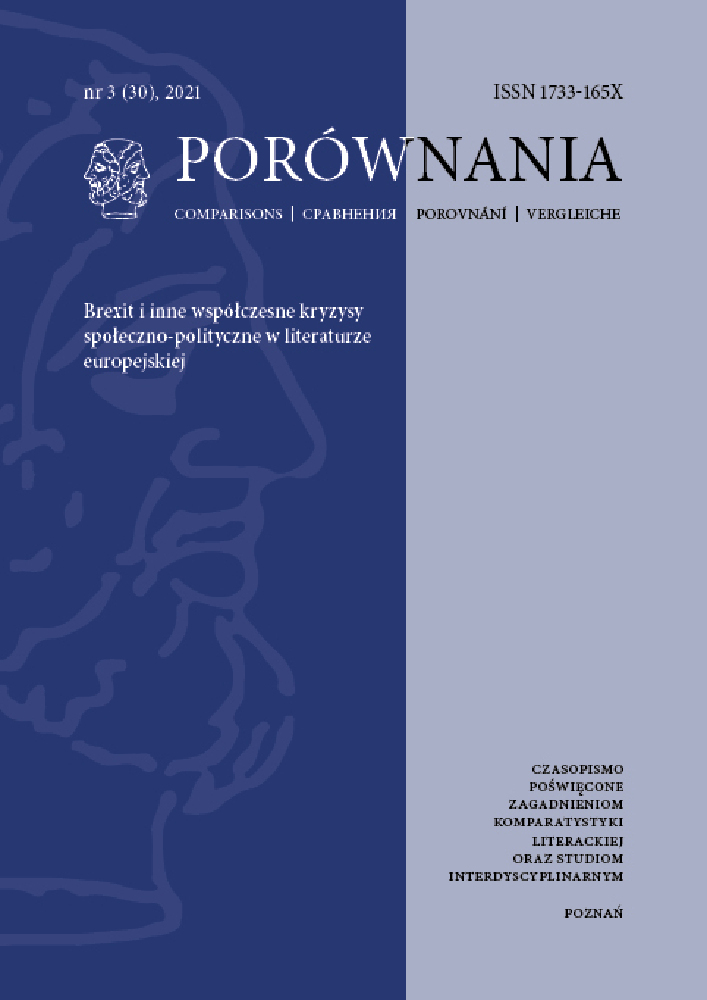Abstrakt
Chociaż porównanie referendum z 2016 roku o wyjściu Wielkiej Brytanii z Unii Europejskiej do I wojny światowej wydawałoby się absurdalne, te dwa okresy mają ze sobą coś wspólnego. Wynika to z faktu, iż okres lat 1914–1918 wywołał lawinę poezji tworzonej nie tylko przez uznanych poetów, ale także przez tysiące zwyczajnych Brytyjczyków, dla których poezja była sposobem na wyrażenie własnych emocji. W podobny sposób okres po referendum spowodował masową reakcję zwykłych obywateli. Prezentowany artykuł podejmuje próbę przyjrzenia się temu, jak raz jeszcze Brytyjczycy wykorzystują poezję do wyrażenia swoich obaw i frustracji.
Bibliografia
Allardice, Lisa. “Interview: Carol Ann Duffy.” The Guardian 27 Oct 2018.
Allesio, Sara. Reading Brexit Through BrexLit: Fictional Responses to Political Crisis, 2020, http://amsdottorato.unibo.it/9427/. Accessed 07 April 2021.
Anaxagorou, Anthony. After the Formalities. London: Penned in the Margins, 2019.
Anne Varty. “Poetry and Brexit.” Brexit and Literature: Critical and Cultural Responses. Ed. Robert Eaglestone. Abingdon: Routledge, 2018. 59–65.
Archer, Neil. Cinema and Brexit. London: Bloomsbury Academic, 2020.
Armitage, Simon. “The Brink.” www.skyartsart50.tv/projects/thebrink/. Accessed 24 March 2021.
Auden, W. H. The Collected Poetry of W. H. Auden. New York: Random House, 1945.
Bilston, Brian. “57 Varieties of Brexit.” https://brianbilston.com/2017/06/18/57-varieties-of-brexit/. Accessed 15 March 2021.
Bilston, Brian. “Brexit in Pursuit of a Bear.” https://tinyurl.com/2p45b35a. Accessed 06 March 2021.
Birdsey, Joseph. “Pencil Drawn Borders.” https://tinyurl.com/487bw2yd. Accessed 28 March 2021.
Brooke, Rupert. The Poetical Works. London: Faber and Faber, 1970.
Butters, Paul. “Brexit.” https://hellopoetry.com/words/brexit. Accessed 19 April 2021.
Clarke, David. The Europeans. Rugby: Nine Arches Press, 2019.
Colvin, Callum and Robert Crawford. Brexit Tears. Newtyle: Kettilonia, 2020.
Cosslett, Rhianon Lucy. “Brexit Poetry May not Heal our Divided Nation, but it Helps.” Guardian 7 Nov. 2019.
Crace, John. “Preface.” The Good Brexiteer’s Guide to English Lit. John Sutherland. London: Reaktion Books, 2018. 11–16.
Duffy, Carol Ann. Sincerity. London: Picador, 2019.
Dunkerley, Hugh. Kin. Blaenau Ffestiniog: Cinnamon Press, 2019.
Eaglestone, Robert, ed. Brexit and Literature: Critical and Cultural Responses. London: Routledge, 2018.
Ferguson, Donna. “Poetry Sales Soar as Political Millennials Search for Clarity.” The Guardian 21 Jan. 2019.
Flood, Alison. “Brexit Poems and Dirty Limericks: Poetry Left in Boxes Across Exmoor to Be Compiled for Book.” The Guardian 7 Sept. 2016.
Graves, Robert. The Common Asphodel: Collected Essays on Poetry 1922–1949. (1949). London: Hamish Hamilton, 1949.
Gunn, George. “The Silent Poetry of Brexit.” Bella Caledonia 31 Jan. 2019.
Hagger, Nicholas. Fool’s Paradise: The Voyage of a Ship of Fools from Europe. A Mock Heroic Poem on Brexit. Alresford: John Hunt Publishing, 2020.
Harrison, Tony. V. Newcastle upon Tyne: Bloodaxe, 1985.
Higgins, Kevin. “Exit, a Brexit Poem by Kevin Higgins.” The Irish Times 5 Dec. 2017.
Hope, Christopher. https://twitter.com/hashtag/BrexitPoems?src=hashtag_click. Accessed 03 April 2021.
Kelly, Richard T. “Brexit in Fact and Fiction.” Critical Quarterly 60.2 (2018): 74–85.
Klepuszewski, Wojciech. The Missing Chapter—Women’s Poetry of the Great War. Koszalin: Wydawnictwo Politechniki Koszalińskiej, 2006.
Lehóczky, Ágnes and Welsch, J. T., eds. Wretched Strangers: Borders Movement Homes. Norwich: Boiler House Press, 2018.
McNish, Hollie. “British National Breakfast.” https://tinyurl.com/yym26d8r. Accessed 15 March 2021.
McNish, Hollie. “Foreign.” https://derbynews.org.uk/2014/03/30/foreign-by-hollie-mcnish/. Accessed 14 March 2021.
McRae, Andrew. https://www.exeter.ac.uk/news/university/title_749467_en.html. Accessed 10 March 2021.
Meyer, Michael, ed. The Collected Poems of Sidney Keyes. London Routledge&Kegan Paul, 1945.
Mitchell, Adrian. Tell me Lies: Poems 2005–2008. Tarset: Bloodaxe, 2009.
Moran, Lee. “ Britons Turn To Poetry To Express Their Feelings On Brexit.” The Huffington Post, 26 June 2016.
Motion, Andrew. “After the EU Referendum: In the Air.” The Guardian 2 July 2016.
Murphy, Keith. K.R. Murphy: Official Site of Sometime Author & Poet, https://keithmurphy26.wixsite.com/blog. Accessed 22 March 2021.
Musiyiva, Ambrose, ed. Bollocks to Brexit: An Anthology of Poems and Short Fiction. CivicLeicester, 2019.
Normal, Henry. “Cake (A poem with layers).” https://www.northernsoul.me.uk/henry-normal-brexit-poem. Accessed 6 March 2021.
Pittel, Harald. “Fiction in Dark Times: the Brexit Novel and Ali Smith,” Hard Times 101.1 (2018): 58–67.
Powell, Anne, ed. A Deep Cry: First World War Soldier-Poets Killed in France and Flanders. Stroud: Sutton Publishing, 2000.
Ravinthiran, Vidyan. The Million-Petalled Flower of Being Here. Hexham: Bloodaxe, 2019.
Read, Jonathon. “The Telegraph Asks for Brexit Poems and It All Goes Wrong.” The New European 1 May 2018.
Riach, Alan. “Review of Brexit Tears.” The National 3 Aug 2020.
Sutherland, John, ed. The Good Brexiteer’s Guide to English Lit. London: Reaktion Books, 2018.
Taylor, Paul. “My Country; A Work in Progress, Dorfman, National Theatre, review: Carol Ann Duffy Brings a Major’s Poet’s Ear to the Music of the Text.” The Independent 13 March 2017.
Tempest, Kate (Kae). “Europe is Lost.” https://tinyurl.com/8rx3bs. Accessed 14 March 2021.
Tempest, Kate (Kae). “People’s Faces.” https://tinyurl.com/442p5b8e. Accessed 14 March 2021.
Trim. “Brexit Song Sing It (Go West).” https://allpoetry.com/poems/about/brexit. Accessed 18 April 2021.
Wheatley, David. “Poetry in the Age of Brexit.” The Irish Times 23 Jan. 2018.
Wright, Luke. “The Panel.” https://www.lukewright.co.uk/the-panel-edit/. Accessed 14 March 2021.
Licencja
Utwory opublikowane w czasopiśmie „Porównania”, na platformie Pressto należącej do Uniwersytetu im. Adama Mickiewicza w Poznaniu są udostępniane na licencji Creative Commons Uznanie autorstwa - Bez utworów zależnych 4.0 Międzynarodowe (CC BY-ND 4.0)
Tym samym wszyscy zainteresowani są uprawnieni do korzystania z utworów opublikowanych pod następującymi warunkami:
-
uznania autorstwa — czyli obowiązek podania wraz z rozpowszechnianym utworem informacji o autorstwie, tytule, źródle (odnośniki do oryginalnego utworu, doi) oraz samej licencji
-
bez utworów zależnych — remiksując, przetwarzając lub tworząc na podstawie utworu, nie wolno rozpowszechniać zmodyfikowanych treści.
-
brak dodatkowych ograniczeń — nie można korzystać ze środków prawnych lub technologicznych, które ograniczają innych w korzystaniu z utworu na warunkach określonych w licencji.
Uniwersytet im. Adama Mickiewicza w Poznaniu zachowuje prawo do czasopisma jako całości (układ, forma graficzna, tytuł, projekt okładki, logo itp.).
Autor zachowuje prawa majątkowe, ale udziela zgody Uniwersytetowi im. Adama Mickiewicza w Poznaniu na wykorzystanie dzieła. Autorzy tekstów zakwalifikowanych do publikacji proszeni są o wypełnienie podpisanie i przesłanie umowa (PL) agreement (EN)
Agreement for granting a royalty-free license to works with a commitment to grant a CC sub-license





